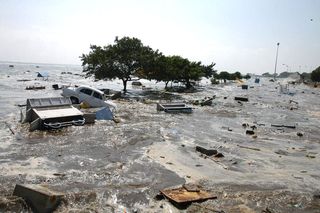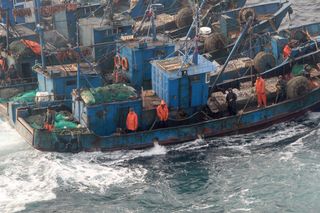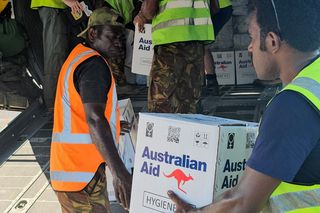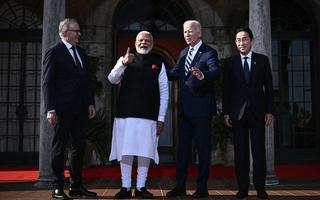Executive summary
This paper advances the case for enhanced Quad cooperation on maritime security and climate change. Climate change exacerbates prevailing maritime security challenges, including illegal fishing, natural disasters, piracy and maritime boundary issues. As the effects of climate change are not bound by state or maritime boundaries, a coordinated, multilateral approach to maritime security and resulting challenges across the Indo-Pacific is needed from middle and major powers in the region. The Quad’s comprehensive approach to non-traditional security and existing whole-of-region initiatives provides a strong basis for enhanced cooperation on interrelated security challenges. Increasing its attention on maritime security and climate change issues will help operationalise the Quad’s agenda, streamlining Quad programs to focus on achievable and inclusive initiatives that strengthen Indo-Pacific security. To combat criticisms of the Quad as a ‘talk shop,’ the partnership should focus on providing a platform for regional institutions to convene and coordinate and deliver public goods consistent with the region’s needs.
Policy recommendations
- Convene a joint dialogue of the Maritime Security and Climate Change Working Groups that is inclusive of regional organisations, such as the Association of Southeast Asian Nations (ASEAN), the Pacific Islands Forum (PIF) and the Indian Ocean Rim Association (IORA), to improve maritime and climate security.
- Establish a Quad Coast Guard meeting to coordinate and strengthen regional maritime, climate and environmental security programs.
- Expand the Quad’s Humanitarian Assistance and Disaster Relief (HADR) tabletop exercise to include regional organisations, such as ASEAN, PIF and IORA.
Introduction
The Indo-Pacific region is the most climate-vulnerable region in the world. The effects of climate change will exacerbate pre-existing security issues in Indo-Pacific countries, including political instability, poverty, resource scarcity and food security. Climate change and maritime security are interrelated challenges. It is predicted that piracy and transnational crime will increase as a result of climate displacement, poverty, pollution and ocean warming.1 By overwhelming state resources, climate change will increase the need for maritime security efforts, including policing and disaster management2 — threatening peace, stability, and prosperity in the Indo-Pacific.
The development of the Quad has been shaped by environmental disasters. In 2004, the Indian Ocean Tsunami killed 227,898 people, becoming the deadliest natural disaster of the twenty-first century. To coordinate Humanitarian Assistance and Disaster Response (HADR), Australia, the United States, Japan and India formed the Tsunami Core Group. The group provided more than 40,000 humanitarian responders alongside helicopters, cargo ships and aircraft.3 Illustrating the maritime and environment nexus, Maritime Domain Awareness (MDA) was used for tsunami warning systems, and HADR in the immediate aftermath of the tsunami, and for assessing damage to infrastructure during disaster relief.4 The institutional knowledge and operational experience born out of the Indian Ocean Tsunami response are key to operationalising the Quad in support of a safer Indo-Pacific that is more prepared for similar catastrophes.
By overwhelming state resources, climate change will increase the need for maritime security efforts, including policing and disaster management — threatening peace, stability, and prosperity in the Indo-Pacific.
The Quad is well-placed to respond to climate and environmental disasters in the Indo-Pacific. The intersecting work of Quad working groups and the bilateral and trilateral programs of Quad states5 focused on climate and maritime security demonstrates a pre-existing commitment and expertise in delivering these public goods. Furthermore, the Quad’s broader, whole-of-region focus makes it well placed to address cross-border issues, compared to organisations such as the Pacific Islands Forum, the Association of Southeast Asian Nations and the Indian Ocean Rim Association, which are bound to regional areas. By enhancing the Quad’s cooperation on climate issues in the maritime domain and including key regional institutions in those efforts, it is easier to respond to the broader, regional effects of climate change. Meeting urgent needs in the region will elevate the Quad’s legitimacy as a provider of public goods.
The Quad has struggled to fulfil the vast agenda that was outlined at the 2024 Leaders’ Summit in Delaware. Acknowledging the overlapping nature of maritime security and natural disasters will help to focus the Quad’s programs.
To enhance the Quad’s maritime security and climate change agenda, it should convene working group meetings that include representatives of ASEAN, PIF and IORA to operationalise inclusive, whole-of-region capacity building that recognises the link between maritime security and climate change issues. This can be further entrenched with the creation of a Quad Coast Guard meeting to coordinate pre-existing maritime security capacity building. Finally, expanding Quad HADR tabletop exercises to include relevant representatives from ASEAN, PIF, and IORA will build habits of cooperation for managing cross-border disaster response, relief and resiliency.
Maritime security and climate change in the Quad
In recent years, the Quad has sought to grow its standing by providing public goods in the Indo-Pacific through six working groups: Climate; Critical and Emerging Technology; Cyber; Health Security; Infrastructure; and Space. However, delivering on this varied suite of priorities has proven a major challenge. The Quad has been criticised by commentators for being a ‘talk shop’, unable to implement its objectives due to too many disparate programs and a lack of engagement with local stakeholders.6 The lacklustre performance of the Quad’s COVID-19 Vaccine Partnership embodied these challenges.7 The Quad’s extensive and ambitious agenda puts it at risk of not living up to its own expectations and those of the region.
The Quad must refine its focus to succeed. To do so, it can build on the areas where it has been the most successful, which are in its climate and maritime working groups. This paper does not suggest that the Quad should disregard its focus on other issues, such as health, infrastructure and submarine cables. Instead, it notes the interconnected nature of these issues, given the rise of health insecurity due to climate change; infrastructure’s role in supporting climate resilience; and the importance of enhanced maritime security to securing connectivity.8 Accordingly, decisively tackling climate-related maritime security issues is the most straightforward way to deliver on the host of Quad priorities across its established working groups.

Presently, the Quad working groups on climate change and maritime security make effective inputs into building the capacity of states in the region. The Quad coordinates HADR through the Humanitarian Quad Partnership. Climate change adaptation and mitigation are managed through the Quad Climate Change Adaptation and Mitigation Package (Q-CHAMP), while the Indo-Pacific Maritime Domain Awareness Program (IPMDA) supports states to better manage their maritime domain.9
In regard to HADR, this year’s Quad Foreign Ministers’ Meeting in Tokyo highlighted that the Quad partners “collectively contributed over [US]$5 million in humanitarian assistance” after a tragic landslide in Papua New Guinea in May 2023.10 This is in addition to the Quad support for recovery and resiliency in Tonga after a volcanic eruption in January 2022.11
On maritime climate change issues, Q-CHAMP provides Maritime Domain Awareness (MDA) information for the Pacific-led Weather Ready Pacific Program, with the Quad assisting with early warning systems and data sharing.12 For climate-ready infrastructure, the Quad supports global partnerships such as the Coalition for Disaster Resilient Infrastructure and the Infrastructure for Resilient Island States.13 The Quad Climate Information Services Initiative builds “capacity, cooperation and information-sharing mechanisms for climate data” in the region to support climate resilience, particularly in the Pacific.14 Further, the Indo-Pacific Oceans Research Alliance links leading ocean research organisations from each Quad country to exchange data, including on rising sea levels and how climate change impacts marine ecosystems.15 These programs demonstrate the interrelated nature of climate change and maritime security.
The most significant of the Quad’s maritime security initiatives is the IPMDA, which links maritime security issues, climate change and environmental disasters. MDA is important for disaster forecasting, post-disaster damage assessments, infrastructure assessments and mitigation. Littoral states across South Asia, Southeast Asia and the South Pacific have the most to benefit from utilising the IPMDA for environmental and disaster mitigation, response and relief. With climate change poised to cause more frequent natural disasters, MDA is critical to predict future weather patterns and the geography of imminent disasters.16
The IPMDA seeks to “work with regional partners to respond to humanitarian and natural disasters and combat illegal fishing.”17 In “consultation” with partners, it “provides technology and training to support enhanced, shared, maritime domain awareness.” Quad countries cooperate on the IPMDA on the basis that data is a valuable public good. The IPMDA works in conjunction with three regional fusion centres: the Singapore Information Fusion Centre, the Pacific Fusion Centre, and, more recently, the Information Fusion Centre-Indian Ocean Region.
A look at the 2024 Quad Fact Sheet reveals a suite of programs by Quad states at the bilateral, trilateral and Quad levels. Genuine Quad programs remain limited. Alongside this ... the region is still unclear on the Quad’s purpose.
However, the IPMDA’s success has been limited to date. In Southeast Asia, instead of providing new data, the IPMDA uses pre-existing data that countries in Southeast Asia already have access to.18 In other cases, greater access to MDA does not always equate to strengthening maritime capacity, as countries may lack the adequate human capital to analyse the data collected and prosecute a response.19 To strengthen the IPMDA’s capacity-building arm, the 2024 Quad Foreign Ministers’ meeting announced that the IPMDA will now include “technical cooperation in close consultation with regional partners.”20 This will better equip countries to use the data collected by the IPMDA. Further, at the 2024 Quad Leaders’ Summit, the Quad announced the Maritime Initiative for Training in the Indo-Pacific (MAITRI) to strengthen “Indo-Pacific partners to maximise tools provided through IPMDA and other Quad initiatives, to monitor and secure their waters, enforce their laws and deter unlawful behaviour.”21 These announcements demonstrate that the Quad is listening to regional concerns and scaling up partners’ maritime capacities.
Despite these initiatives, the Quad faces criticism from experts for being “all optics, no substance.”22 These are valid criticisms. After being elevated to leader-level meetings under the Biden administration, Quad programs have gotten lost in the summitry. A look at the 2024 Quad Fact Sheet, for example, reveals a suite of programs by Quad states at the bilateral, trilateral and Quad levels. Genuine Quad programs remain limited. Alongside this, despite attempts by the Quad to clarify its vision in the 2023 Quad Leaders’ Vision Statement, the region is still unclear on the Quad’s purpose.23 By narrowing the Quad’s focus on maritime security and climate change, building upon the success of its existing programs, and including regional organisations in Quad dialogues — the Quad can carve out a purpose in supporting maritime and environmental security in the Indo-Pacific and provide a platform for inter-organisational cooperation.
Recommendation 1
Convene a Maritime Security and Climate Change Working Group joint dialogue that is inclusive of regional organisations, such as ASEAN, PIF and IORA, to improve maritime and climate security
Regional institutions, such as ASEAN, PIF and IORA, understand the impact climate and maritime issues have on security. The ASEAN Maritime Outlook feeds into its existing work, including a Consultative Workshop on Climate Change, Fisheries and Aquaculture, and its Climate Outlook Forum, with a particular focus on the Blue Economy and natural disasters. The IORA Outlook on the Indo-Pacific promotes “conservation, sustainable use and management of marine resources” alongside “addressing the challenges of climate change, biodiversity loss [and] marine pollution.”24 The PIF Strategy for the Blue Pacific Continent recognises climate change as the biggest threat to regional security, emphasising the importance of stability in the Pacific maritime environment to governance, inclusion and equality, resilience, and well-being, and placing “great value on our ocean” as a means of “deep connection to our community, resources, livelihoods, faiths, cultural values and traditional knowledge.”25
A Quad working group could be more capable than other regional bodies, in many respects, in specifically addressing these issues. The activities of its pre-existing climate change and maritime security programs, such as QCHAMP and the IPMDA that utilise MDA for environmental and climate monitoring, could be naturally developed into a joint maritime security and climate change working group dialogue.
The Quad is uniquely placed to address the interrelated challenges of climate change and maritime security in the Indo-Pacific due to its holistic focus on an array of non-traditional security threats, which enables members to understand and address the simultaneous challenges posed by both maritime security and climate change. Quad members also provide additional support to shared partners in the region through a range of programs at the sub-Quad level (bilateral and trilateral cooperation) and the supra-Quad level (Quad cooperation with other countries).26 Whilst these programs have been successful, more can be done to strengthen the link between maritime and climate security, especially by donor countries, such as the Quad members. The Quad’s non-traditional public goods delivery focus will help all four countries to deepen their understanding of the climate-maritime security nexus, to provide more comprehensive support on these interrelated issues.
The Quad should convene a joint meeting to ensure that the maritime impacts of climate change are being adequately discussed and managed.
In addition to the independent meetings of the climate change and maritime security working groups, the Quad should convene a joint meeting to ensure that the maritime impacts of climate change are being adequately discussed and managed. A Quad Maritime and Climate working group meeting could address: the role of coast guards in providing regional support for climate and maritime security problems; the role of MDA for environmental disaster mitigation, response and relief; and the provision of whole-of-region HADR support.
To strengthen engagement with other states in the region and demonstrate the Quad’s commitment to regional institutions, it should extend invitations to representatives of ASEAN, PIF and IORA. This will ensure that the most climate-vulnerable Indo-Pacific states will be able to contribute to Quad discussions on climate change and maritime security as the recipients of Quad programs. More inclusive Quad meetings will help to build habits of cooperation and communication between the Quad and other regional partners during times of crisis.
It is also important to acknowledge that whilst all Quad members are Indo-Pacific states, they do not include states from Southeast Asia and the Pacific Islands. Whilst not proposing an expansion of the Quad, this paper suggests that by strengthening its focus on climate and maritime security issues — two issues with which ASEAN and PIF are particularly concerned — the Quad will earn greater confidence within the Indo-Pacific region.
Further, the upcoming Quad maritime legal dialogue should raise the impact of sea level rise on maritime boundaries, as communicated in the PIF 2023 Declaration on the Continuity of Statehood and the Protection of Persons in the Face of Climate Change-Related Sea-Level Rise.27
Recommendation 2
Establish a Quad Coast Guard meeting to coordinate and strengthen regional maritime security programs
The coast guards of Quad countries contribute significantly to regional maritime security. Coast guards enforce domestic maritime laws and provide international capacity building. They play an important role in providing constructive responses to illegal, unreported and unregulated (IUU) fishing, environmental protection, and marine resource management, as well as supporting surveillance and maritime domain awareness activities.28
Quad coast guards are key actors in strengthening maritime capacity in the region. The Japanese Coast Guard makes varied efforts to support maritime security capacity building in the region, particularly in the Pacific Islands and Southeast Asia.29 The focus of India’s Coast Guard has primarily been the Indian Ocean and supporting South Asian partners.30 The US Coast Guard is proactive in its international engagements and builds regional military safety and security capacity.31 One example is the US Coast Guard’s deployment of cutter Harriet Lane for Operation Blue Pacific patrol, which cooperated with partners across the Pacific to strengthen technical expertise and joint patrols to build maritime security awareness and capacity.32 A hallmark of Australia’s international maritime security cooperation is the Pacific Maritime Security Program (formally known as the Pacific Patrol Boat Program), which provides Pacific partners with patrol boats (including maintenance and sustainment), training, aerial surveillance and enhanced regional coordination and communication.33 The program seeks to strengthen states’ responses to IUU fishing, drug trafficking and other maritime security issues.

At the sub-Quad level, Japan and the United States have a coast guard memorandum of understanding. Meanwhile, Australia and India have long collaborated on environmental pollution and trafficking in the Indian Ocean.34 Regionally, the coast guards coordinate through the Heads of the Asian Coast Guard Agencies Meeting. In 2023, the US Coast Guard hosted the Pacific Quadrilateral Defense Coordinating Group meeting, bringing together Australia, France, New Zealand and the United States. It focused on enhancing maritime security and tackling regional challenges posed by climate change in the Pacific.35 At the national level, all Quad members recognise the impact of climate change through their national maritime strategies and related documents. However more can be done to shore up sub- and supra-Quad coast guard activity in the climate domain.
One of the challenges for coast guard cooperation among Quad members more broadly is conflicting institutional structures. The US Coast Guard sits in the Department of Homeland Security, although in the event of a conflict, it can be commanded by the Navy. In India, the coast guard sits under the Ministry of Defence; and in Japan, it falls under the Ministry of Land, Infrastructure, Transport and Tourism. While Australia does not have a coast guard, its de-facto force, the Maritime Border Command is multi-agency, sitting under the Department of Home Affairs and commanded by a rear admiral, receiving support from the Australian Defence Force and Border Force.36 Both the Maritime Border Command and the Royal Australian Navy in turn support international maritime security capacity, such as the US, Indian, and Japanese coast guards.37 The bureaucratic challenges of inter-agency coordination however, have subdued calls for Quad coast guard cooperation.
The 2024 Quad Leaders’ Summit however, provided initiatives to enhance coast guard cooperation. The leaders announced a Quad-at-Sea Ship Observer Mission in 2025, which will enhance interoperability as the Quad countries “spend time on board a US Coast Guard vessel operating in the Indo-Pacific.”38 Alongside the many programs existing in sub- and supra-Quad domains, the partnership of Quad coast guards would complement efforts to coordinate resources and strengthen existing maritime security initiatives.
Cooperation among Quad member states and other allies in the region over soft security issues, such as climate change and environmental protection, may help strengthen trust and interoperability between partner coast guards and navies.
Whilst Quad countries should be cautious about expanding an already packed Quad agenda, a Quad Coast Guard meeting is a natural extension of pre-existing work by the maritime security working group, the IPMDA and the Quad-at-Sea Ship Observer Mission.39 By enhancing the focus of the Quad through intra-working group cooperation, it will help to strengthen public goods delivery. Quad Coast Guard meetings would help to coordinate existing sub- and supra-Quad coast guard activities and would likely clarify cross-departmental collaboration between Quad members. The varying responsibilities and reporting authorities of each of the Quad coast guards require more clarification within the Quad partners than is currently the case.
A Quad Coast Guard meeting would help to build habits of cooperation in HADR that would likely be helpful during future regional climate crises, as demonstrated by the 2004 Indian Ocean Tsunami. Further, whilst Quad engagement in the South China Sea has been minimal, cooperation among Quad member states and other allies in the region over soft security issues, such as climate change and environmental protection, may help strengthen trust and interoperability between partner coast guards and navies.40 These meetings will help to consolidate coast guard activities, particularly in Southeast Asia and the South Pacific, to strengthen existing capacity building programs at the sub- and supra-Quad level.
Recommendation 3
Expand the Quad HADR tabletop exercise to include regional organisations, such as ASEAN, PIF and IORA
Despite being the most climate-vulnerable and disaster-prone region in the world, the Indo-Pacific does not have a whole-of-region HADR agency to coordinate disaster response. While there are regional programs, such as the ASEAN Coordinating Centre for Humanitarian Assistance on Disaster Management in Southeast Asia and the recently established Pacific Response Group in the Pacific Islands region, natural disasters are not bound to institutional jurisdictions.41 The Quad’s HADR partnership is the region’s closest answer to an Indo-Pacific HADR agency.
The Quad’s HADR partnership was announced at the May 2022 Quad Leaders’ Summit in Tokyo and signed into operation in September 2022 by the Quad foreign ministers on the sidelines of the United Nations General Assembly meeting. The Quad Partnership on Humanitarian Assistance and Disaster Relief in the Indo-Pacific aims to strengthen “capacity and capability, interoperability and operational synergies to undertake HADR operations.”42 The Quad’s HADR working group has so far established two tabletop exercises, including one in Brisbane last year, which aimed to “strengthen the Quad’s readiness to support regional partners in times of humanitarian disaster.”43

The next Quad HADR tabletop exercise will take place at the Tokyo Leaders’ Summit.44 The Quad has announced it is finalising HADR Standard Operating Procedures to “enable an effective, immediate and cooperated response mechanism between Quad partners.”45 Recent HADR efforts have seen the Quad jointly support Papua New Guinea in its post-disaster landslide relief, contributing over A$5 million in humanitarian assistance and coordinating an “effective international response.”46
Recognising the broader regional effects of natural disasters, Quad HADR tabletop exercises should be expanded to include representatives from ASEAN, PIF and IORA. Including disaster-vulnerable states from South Asia, Southeast Asia and the Pacific Islands will better ensure that the Quad is applying a truly regional lens to its future HADR operations. It will guarantee ASEAN, PIF and IORA centrality not just in Quad statements but also programs.
Closer coordination with pre-existing groupings, such as the ASEAN Coordinating Centre for Humanitarian Assistance on Disaster Management, will help to build habits of cooperation between the Quad and regional partners so that HADR responses can be more successful. A siloed response, whether limited to Southeast Asia, the Pacific Islands or the Indian Ocean, will not always be adequate when providing HADR support as disasters extend beyond land and maritime boundaries. As the 2004 Indian Ocean Tsunami demonstrated, the effects of climate disasters can span multiple regions.
A more holistic approach to regional climate change security and disaster resilience will also enable knowledge sharing and strengthen capacity building. This will provide an opportunity for experts in Southeast Asia, the Pacific Islands and the Indian Ocean to share climate change adaption and mitigation tools, disaster resilience and oceanic resource management skills. This will strengthen the Indo-Pacific identity and sense of community as the region coalesces around common concerns.
By reinforcing the Quad’s operational HADR capacity and working towards more coordination over disaster management, these programs effectively return the Quad to its history of climate and maritime security cooperation in the 2004 Indian Ocean Tsunami. The key to the success of these programs, however, will be consultation with regional partners to emphasise the Quad’s role as a truly inclusive initiative that can deliver on vital public goods.
The production of this brief was supported by the US Department of State.






